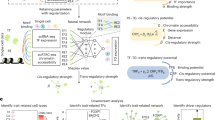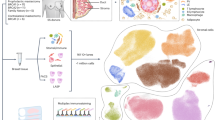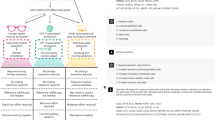Abstract
The combination of single-cell transcriptomics with mitochondrial DNA variant detection can be used to establish lineage relationships in primary human cells, but current methods are not scalable to interrogate complex tissues. Here, we combine common 3′ single-cell RNA-sequencing protocols with mitochondrial transcriptome enrichment to increase coverage by more than 50-fold, enabling high-confidence mutation detection. The method successfully identifies skewed immune-cell expansions in primary human clonal hematopoiesis.
This is a preview of subscription content, access via your institution
Access options
Access Nature and 54 other Nature Portfolio journals
Get Nature+, our best-value online-access subscription
$29.99 / 30 days
cancel any time
Subscribe to this journal
Receive 12 print issues and online access
$209.00 per year
only $17.42 per issue
Buy this article
- Purchase on Springer Link
- Instant access to full article PDF
Prices may be subject to local taxes which are calculated during checkout


Similar content being viewed by others
Data availability
Raw and processed data have been deposited in the Gene Expression Omnibus (https://www.ncbi.nlm.nih.gov/geo/query/acc.cgi?acc=GSE182685). Single-cell gene expression matrices, mtDNA variant calls and GoT results are available at https://vangalenlab.bwh.harvard.edu/resources/maester-2021/.
Code availability
maegatk is available at https://github.com/caleblareau/maegatk, and a table with functional annotation of all possible mtDNA variants is available at https://github.com/EDePasquale/Mitochondrial_variants. Computational analyses are described at https://github.com/petervangalen/MAESTER-2021.
References
Giladi, A. & Amit, I. Single-cell genomics: a stepping stone for future immunology discoveries. Cell 172, 14–21 (2018).
Acosta, J., Ssozi, D. & van Galen, P. Single-cell RNA sequencing to disentangle the blood system. Arterioscler. Thromb. Vasc. Biol. 41, 1012–1018 (2021).
Nam, A. S. et al. Somatic mutations and cell identity linked by genotyping of transcriptomes. Nature 571, 355–360 (2019).
van Galen, P. et al. Single-cell RNA-seq reveals AML hierarchies relevant to disease progression and immunity. Cell 176, 1265–1281 (2019).
Wagner, D. E. & Klein, A. M. Lineage tracing meets single-cell omics: opportunities and challenges. Nat. Rev. Genet. 21, 410–427 (2020).
Liggett, L. A. & Sankaran, V. G. Unraveling hematopoiesis through the lens of genomics. Cell 182, 1384–1400 (2020).
Ludwig, L. S. et al. Lineage tracing in humans enabled by mitochondrial mutations and single-cell genomics. Cell 176, 1325–1339 (2019).
Lareau, C. A. et al. Massively parallel single-cell mitochondrial DNA genotyping and chromatin profiling. Nat. Biotechnol. 39, 451–461 (2021).
Xu, J. et al. Single-cell lineage tracing by endogenous mutations enriched in transposase accessible mitochondrial DNA. eLife 8, e45105 (2019).
Velten, L. et al. Identification of leukemic and pre-leukemic stem cells by clonal tracking from single-cell transcriptomics. Nat. Commun. 12, 1366 (2021).
Hughes, T. K. et al. Second-strand synthesis-based massively parallel scRNA-seq reveals cellular states and molecular features of human inflammatory skin pathologies. Immunity 53, 878–894 (2020).
Macosko, E. Z. et al. Highly parallel genome-wide expression profiling of individual cells using nanoliter droplets. Cell 161, 1202–1214 (2015).
Mimitou, E. P. et al. Scalable, multimodal profiling of chromatin accessibility, gene expression and protein levels in single cells. Nat. Biotechnol. 39, 1246–1258 (2021).
Tu, A. A. et al. TCR sequencing paired with massively parallel 3′ RNA-seq reveals clonotypic T cell signatures. Nat. Immunol. 20, 1692–1699 (2019).
Abdel-Wahab, O. et al. Genetic characterization of TET1, TET2, and TET3 alterations in myeloid malignancies. Blood 114, 144–147 (2009).
Street, K. et al. Slingshot: cell lineage and pseudotime inference for single-cell transcriptomics. BMC Genomics 19, 477 (2018).
Moran-Crusio, K. et al. Tet2 loss leads to increased hematopoietic stem cell self-renewal and myeloid transformation. Cancer Cell 20, 11–24 (2011).
Luchman, H. A. et al. An in vivo patient-derived model of endogenous IDH1-mutant glioma. Neuro. Oncol. 14, 184–191 (2012).
Flavahan, W. A. et al. Insulator dysfunction and oncogene activation in IDH mutant gliomas. Nature 529, 110–114 (2016).
Buenrostro, J. D., Giresi, P. G., Zaba, L. C., Chang, H. Y. & Greenleaf, W. J. Transposition of native chromatin for fast and sensitive epigenomic profiling of open chromatin, DNA-binding proteins, and nucleosome position. Nat. Methods 10, 1213–1218 (2013).
Morgan, M., Obenchain, V., Hester, J. & Pagès, H. SummarizedExperiment: SummarizedExperiment container. R package version 1.24.0 https://bioconductor.org/packages/release/bioc/html/SummarizedExperiment.html (2019).
Stuart, T. et al. Comprehensive integration of single-cell data. Cell 177, 1888–1902.e21 (2019).
Yang, S. et al. Decontamination of ambient RNA in single-cell RNA-seq with DecontX. Genome Biol. 21, 57 (2020).
Acknowledgements
We thank patients for donating cells; C. Couturier and M. Villanueva from the A. Shalek lab for sequencing; A. Kreso, V. Hovestadt and A. A. Tu for helpful discussions; and P. Rogers for technical support. P.v.G., A.A.L. and B.E.B. are supported by the Ludwig Center at Harvard. P.v.G. and V.G.S. are supported by the Harvard Medical School Epigenetics & Gene Dynamics Initiative. P.v.G. is supported by the National Institutes of Health (NIH) R00 Award (CA218832), Gilead Sciences, the Bertarelli Rare Cancers Fund, and is an awardee of the Glenn Foundation for Medical Research and American Federation for Aging Research (AFAR) Grant for Junior Faculty. T.E.M. is supported by the American Brain Tumor Association Basic Research Fellowship in honor of Joel A. Gingras, Jr. T.E.M. and J.A.V. are supported by the UK Brain Tumour Charities Future Leaders Award (GN-000701). C.A.L. is supported by a Stanford Science Fellowship and Parker Scholar award. A.T.S. is supported by NIH grant U01CA260852, the Cancer Research Institute Technology Impact Award and a Pew-Stewart Scholars for Cancer Research Award. L.S.L. is supported by an Emmy Noether fellowship by the German Research Foundation (LU 2336/2-1). J.C.L and D.M.M were supported in part by the Koch Institute Support (core) NIH grant P30-CA14051 from the National Cancer Institute, as well as the Koch Institute–Dana-Farber/Harvard Cancer Center Bridge Project and the Food Allergy Science Initiative at the Broad Institute. V.G.S. is supported by the New York Stem Cell Foundation, a gift from the Lodish family to Boston Children’s Hospital and NIH grant R01 DK103794. V.G.S. is a New York Stem Cell Foundation–Robertson Investigator.
Author information
Authors and Affiliations
Contributions
T.E.M., C.A.L., J.A.V., E.A.K.D., V.L., D.S., K.S., Y.Y., C.A.E.F., D.M.M., A.T.S. and P.v.G. conducted experiments and analyzed the data. T.E.M., C.A.L., L.S.L., G.K.G., A.A.L., J.C.L., B.E.B., V.G.S. and P.v.G. designed the study and interpreted the data. T.E.M. and P.v.G. wrote the manuscript. All authors edited the manuscript.
Corresponding author
Ethics declarations
Competing interests
B.E.B. discloses financial interests in Fulcrum Therapeutics, HiFiBio, Arsenal Biosciences, Chroma Medicine and Cell Signaling Technologies. V.G.S. serves as an advisor to and/or has equity in Novartis, Forma, Cellarity, Ensoma and Branch Biosciences. T.E.M. discloses financial interests in Telomere Diagnostics and Reify Health. A.T.S. discloses financial interests in Immunai and Cartography Biosciences. J.C.L. has interests in Honeycomb Biotechnologies. J.C.L.’s interests are reviewed and managed under the Massachusetts Institute of Technology’s policies for potential conflicts of interest. J.C.L. and the Massachusetts Institute of Technology have filed patents related to the single-cell sequencing methods used in this work. A patent application covering MAESTER has been filed by the Broad Institute of MIT and Harvard. The remaining authors declare no competing interests.
Peer review
Peer review information
Nature Biotechnology thanks the anonymous reviewers for their contribution to the peer review of this work.
Additional information
Publisher’s note Springer Nature remains neutral with regard to jurisdictional claims in published maps and institutional affiliations.
Supplementary information
Supplementary Information
Supplementary Figs. 1–17 and associated legends.
Supplementary Table 1
All variants that were used to inform clonal structures, along with functional annotations. This is an excerpt from a table with annotations for every possible mitochondrial variant (Methods).
Supplementary Table 2
All oligo sequences used for MAESTER on Seq-Well scRNA-seq cDNA.
Supplementary Table 3
All oligo sequences used for MAESTER and TREK-seq on 10x Genomics 3′ v3 scRNA-seq cDNA.
Rights and permissions
About this article
Cite this article
Miller, T.E., Lareau, C.A., Verga, J.A. et al. Mitochondrial variant enrichment from high-throughput single-cell RNA sequencing resolves clonal populations. Nat Biotechnol 40, 1030–1034 (2022). https://doi.org/10.1038/s41587-022-01210-8
Received:
Accepted:
Published:
Issue Date:
DOI: https://doi.org/10.1038/s41587-022-01210-8
This article is cited by
-
Integrative genotyping of cancer and immune phenotypes by long-read sequencing
Nature Communications (2024)
-
Gene-expression memory-based prediction of cell lineages from scRNA-seq datasets
Nature Communications (2024)
-
Studying temporal dynamics of single cells: expression, lineage and regulatory networks
Biophysical Reviews (2024)
-
Single-cell lineage tracing with endogenous markers
Biophysical Reviews (2024)
-
Deciphering cell states and genealogies of human haematopoiesis
Nature (2024)



